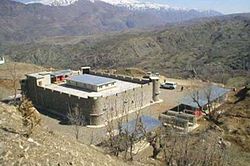- Ministry of Interior (Iraq)
-
The Ministry of Interior of Iraq handles policing and border control in Iraq.[1] The MoI consists of several elements, including the Iraqi Police, Highway Patrol, Traffic Department, Emergency Response Unit, Explosive Ordnance Disposal Unit, and Department of Border Enforcement. Pending passage of the Facilities Protection Service Reform Law, the Ministry is preparing to absorb FPS personnel currently spread among other ministries.[2] The MoI has approximately 380,430 employees and the Ministry of Finance approved US$3.8 billion for its 2008 budget, representing a 21% growth over the previous year.[3]
Under President Saddam Hussein, the Ministry contained a wide range of administrative functions, including keeping Iraq free of Hussein's enemies and other "undesirables".[1] After the United States toppled Hussein in the Iraq War, the Ministry was not dissolved, unlike the defense and intelligence agencies. Combined Joint Task Force 7 intended to hand over policing and internal security duties as soon as possible.[1] However, the Ministry was merely restructured.[1]
Contents
Federal Police (FP)
The Federal Police (FP), sometimes called the National Police, is a paramilitary gendarmerie type force designed to bridge the gap between local policing and the army, allowing the MOI to project power across provinces and maintain law and order while an effective community police is developed. Although called police, the force has been trained primarily for military operations.
Because of frequent allegations of abuse and other illegal activities, the government of Iraq decided in the fall of 2006 to reform and retrain all FP units. The FP transformation will yield a police organization capable of performing criminal investigations as well as tactical operations. The transformation includes a reorganization that resulted in replacement of two division headquarters with a federal police headquarters.[4]
FP units are equipped with small arms, machine guns, pick-up trucks and SUVs. The mechanized battalions are equipped with light armored vehicles.[4]
Department of Border Enforcement (DBE)
Iraq's borders are controlled by the Department of Border Enforcement (DBE) and the Department of Ports of Entry (POE) collectively. The DBE mans 405 border structures. There are 14 land points of entry. As of November 2006, there were 28,300 DBE personnel trained, organized into 5 regions, 12 brigades and 38 battalions. Force generation and equipment goals are on schedule for completion by December 2006.[4]
Facilities Protection Service
The Facilities Protection Service has more than 150,000 personnel who work for 26 ministries and eight independent directorates. Anecdotal evidence suggests that some of them are unreliable and responsible for violent crimes. PM Maliki has announced a reform to consolidate all Facilities Protection Service personnel into a unified organization responsible to the MOI. As of December 2005, the Coalition no longer provides material or logisitcal support to the FPS.[4]
Special Police Commandos
The Special Police Commandos were an elite counter-insurgency unit answering to the Ministry of the Interior.[5] In June 2004, the CPA transferred sovereignty to the Iraqi Interim Government. Under the new prime minister, Ayad Allawi, the CPA appointed a new interior minister, Falah al-Naqib.
Al-Naqib sought to provide the MOI with effective Iraqi constabulary forces after the poor performance of the police in battles against Shiite cleric Muqtada al-Sadr’s Mahdi Army.[6] Al-Naqib created “commando units” of former soldiers from elite units such as Saddam’s Republican Guard. These units, commanded by al-Naqib’s uncle, Adnan Thabit, a former army general, were personally loyal to the minister. The commandos were raised initially without U.S. involvement, were under MOI control, and were outside the U.S. Civilian Police Assistance Training Team (CPATT) assistance program. The U.S. military provided arms and logistical support to these units, which proved effective under Minister al-Naqib’s stewardship in fighting alongside U.S. forces against Sunni insurgents and Shiite militias.
The unit was "formed" (or at least publicly revealed) in September 2004 and numbers about 5,000 officers. Its principal U.S. advisor (Counselor) was Colonel James Steele, who also commanded the U.S. Military Advisory Group in El Salvador from 1984 through 1986.
The Special Police Commando Division, Public Order Division, and Mechanized Police Brigade were merged in 2006 to form the National Police. The National Police has since expanded and been renamed the Federal Police.
Controversy
On April 01, 2009, the Ministry of Interior was awarded the annual Pigasus Award by James Randi "For the funding organization that wasted the most money on pseudo-science… Iraq's Interior Ministry had, by the end of 2009, spent USD $85,000,000 on a dowsing rod called the ADE 651. (Each individual unit cost up to USD $60,000.) Despite an international uproar and continual car bomb detonations in Iraq, the things are still being used, and the Ministry is still defending its decision to buy them [as of 2009]."[7] Investigations by the BBC, U.S. Naval EOD Technology Division and other organisations have reported that these and similar devices are fraudulent and little more than "glorified dowsing rods" with no ability to perform claimed functions. [8] [9]
Notes
- ^ a b c d Rathmell, Andrew. Developing Iraq's security sector: the coalition provisional authority's experience. Rand Corporation. pp. 42–45. ISBN 0833038230.
- ^ “Measuring Stability and Security in Iraq,” March 2008 Report to Congress in accordance with the Department of Defense Appropriations Act 2008 (Section 9010, Public Law 109-289).
- ^ Ibid, page 37.
- ^ a b c d Measuring Security and Stability in Iraq, November 2006
- ^ Iraq 'death squad caught in act', - Q&A on Iraq's militias, - Max Fuller, For Iraq, "The Salvador Option" Becomes Reality and - Guy Calaf, Iraqi Special Police Commandos
- ^ Robert Perito, Special Report No. 223, United States Institute of Peace, May 2009
- ^ http://www.randi.org/site/index.php/swift-blog/928-the-2009-pigasus-awards.html
- ^ Hawley, Caroline (2010-06-08). "Police raids expand bomb detector probe". BBC News. http://news.bbc.co.uk/1/hi/uk/10269170.stm. Retrieved 2010-06-09.
- ^ http://www.docstoc.com/docs/23365128/Test-Report-The-Detection-Capability-of-the-Sniffex-Handheld-Explosives-Detector
External links
Military Law enforcement Ministry of Interior · Iraqi Police · Facilities Protection Service · Department of Border Enforcement · Private Security Company Association of Iraq
Intelligence Categories:- Government ministries of Iraq
- Internal affairs ministries
- Law enforcement in Iraq
Wikimedia Foundation. 2010.

